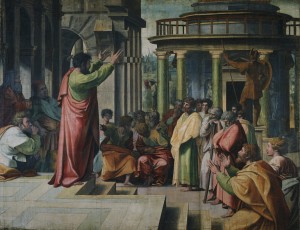Courage and Coherence
 It is the incoherence of the faithful and the pastors what undermines the witness of the Church. The apostles were simple people, but they were not afraid of anything or anyone. Those were the concepts at the center of Pope Francis’ homily during a Mass at the Church of Saint Paul Outside the Walls earlier this month. The words of Francis are a challenge to the flock to grow in courage and faithfulness. We are called to be generous in presenting the faith to the world boldly. In a world growing hostile to the Christian faith that means we may have to run the risk of losing our life.
It is the incoherence of the faithful and the pastors what undermines the witness of the Church. The apostles were simple people, but they were not afraid of anything or anyone. Those were the concepts at the center of Pope Francis’ homily during a Mass at the Church of Saint Paul Outside the Walls earlier this month. The words of Francis are a challenge to the flock to grow in courage and faithfulness. We are called to be generous in presenting the faith to the world boldly. In a world growing hostile to the Christian faith that means we may have to run the risk of losing our life.
In his homily, the pope recalled the attitude of St. Francis and his followers who strove to serve his brothers even if only with mere words. All of us can be saints, everyday saints; a sort of middle class of sainthood is open to everyone. “Ambition, careerism, the desire for worldly success, the desire to dominate others, the idea that we are the only architects of our own lives” are the “idols” that stand in the way of a coherent witness. Those watching our actions will be better disposed to hear our words if our deeds show that our teaching truly applies to ourselves first. That is specifically important to those who are averse to the Gospel. At that point, courage to declare the truth requires the extraordinary love shown by Jesus on the Cross: we must be willing to lose our life in the process of trying to save the souls of those who hate us or hate our message.
The light of the Gospel is love accompanied by words, action and hope. That strong mix was once able to change the ancient world but it required faith and courage. Even those disciples who had been fearful at the time of Christ’s crucifixion understood this point. The example of the Cross and the wonder of the Resurrection they witnessed afterwards gave them the courage to confront those who had ordered Christ’s death and tell them “We must obey God rather than men.”
That boldness is the result of experiencing Christ’s presence. That is what compels us to bear witness. When we meet “misunderstanding and adversity,” then we can imitate Christ who in His Passion responded with meekness, love, and truth.
How do we translate Francis advice to our daily lives? He gave us a few examples. One of them is Fr. Passi, founder of the Institute of the Sisters Teachers of St. Dorothy. The charism of Fr. Passi was, according to his own words, to communicate “the fire of the love of Christ.” Passi often said that one has to be on fire to start a fire. Once could hardly transmit the love of Christ without loving Christ oneself. Implicit in that is the concept of a good example. How could someone learn to imitate Christ if those who teach His message don’t imitate Him themselves?
By now we are pretty well acquainted with the life and example of our new Pope. We have learned that his simplicity is not a mere pose but a vital, dynamic way of teaching the core of his spirituality. That method is deeply rooted in a careful observation of Christ’s way of teaching the Gospel, combining actions and words. His aim was always to demonstrate the effects of the love of God in the minds and hearts of those around Him. That is in essence what we find when we read the stories told by those who walked with Him. Even for those who were not there, like St. Paul, the method was evidently clear. It was Paul himself who later told us “imitate me as I imitate Christ.”
Catholics living their lives all over the world should consider living their lives building and sustaining the common good. That may not be well received by many. Too many people are living lifestyles that openly contribute to the detriment of society at large. If we are to set the world on fire with the love of Christ we must address those first just like Christ did. To succeed in that Herculean task one minute of example is worth an hour of preaching. Today Pope Francis is telling us that this is our time to shine.

